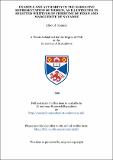Files in this item
Example and authority in the narrative representation of women, as illustrated in selected writings of Christine de Pizan and Marguerite de Navarre
Item metadata
| dc.contributor.advisor | Haxell, Nicky | |
| dc.contributor.advisor | Sneddon, Clive R. | |
| dc.contributor.author | Ramsay, Alison J. | |
| dc.coverage.spatial | 226 p. | en_US |
| dc.date.accessioned | 2018-05-17T09:44:57Z | |
| dc.date.available | 2018-05-17T09:44:57Z | |
| dc.date.issued | 1999-09 | |
| dc.identifier.uri | https://hdl.handle.net/10023/13365 | |
| dc.description.abstract | This thesis examines the use of authority and example in the narrative representation of women in selected writings of Christine de Pizan and Marguerite de Navarre. In this thesis, it is shown that these two women writers reject the universalised notion of Woman and strive to create an alternative, not oppositional, view of the female sex. By working within established literary parameters, adopting authority from earlier works and adapting this rhetorical tool, firstly by editing or altering their sources and, secondly by incorporating the authority of personal experience into their narratives, Christine de Pizan and Marguerite de Navarre establish their own auctoritas. Similarly, the rhetorical device of example is appropriated and modified, again through a subtle process of editing and revision and by the self-inscription of the authors into their exempla. Through their use of authority and example, these women writers expose the notion of Woman as flawed and, in so doing, undermine the validity of the codes of conduct propounded for women by the canon. This thesis contends that Christine de Pizan and Marguerite de Navarre defy the patristic unipolar model of human sexuality by adopting a bi-polar model, deliberately placing the prevailing notion of Woman at the opposite, and therefore negative, pole to Man. Thereafter, through their constant rejection of universalising generalisation, they create a neutral space between the poles of Man and Woman wherein women are shown capable of active participation in a society. This thesis is undertaken from the perspective of a woman('s) historian and literary analyst, making use of a new historicist and gender-based theoretical analysis of the Livre de la Cite des Dames, the Livre des Trois Vertus and the Heptaméron situated within an appropriate historical context. This thesis is the first comprehensive comparative study of the rhetorical devices used by these two women authors in their narrative representation of women. | en_US |
| dc.language.iso | en | en_US |
| dc.publisher | University of St Andrews | |
| dc.subject.lcc | PQ155.W6R2 | en |
| dc.subject.lcsh | Christine, de Pisan, ca. 1364-ca. 1431. | en |
| dc.title | Example and authority in the narrative representation of women, as illustrated in selected writings of Christine de Pizan and Marguerite de Navarre | en_US |
| dc.type | Thesis | en_US |
| dc.type.qualificationlevel | Doctoral | en_US |
| dc.type.qualificationname | PhD Doctor of Philosophy | en_US |
| dc.publisher.institution | The University of St Andrews | en_US |
This item appears in the following Collection(s)
Items in the St Andrews Research Repository are protected by copyright, with all rights reserved, unless otherwise indicated.

